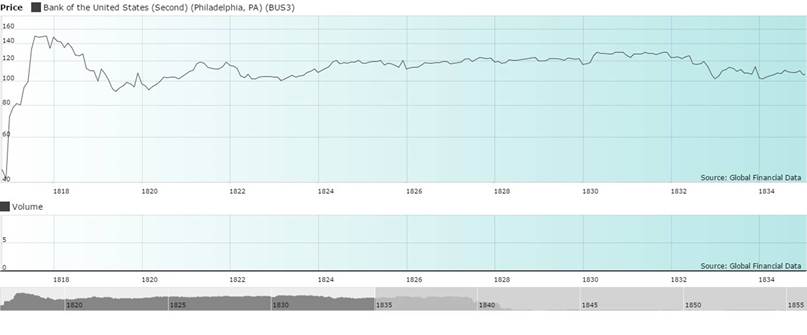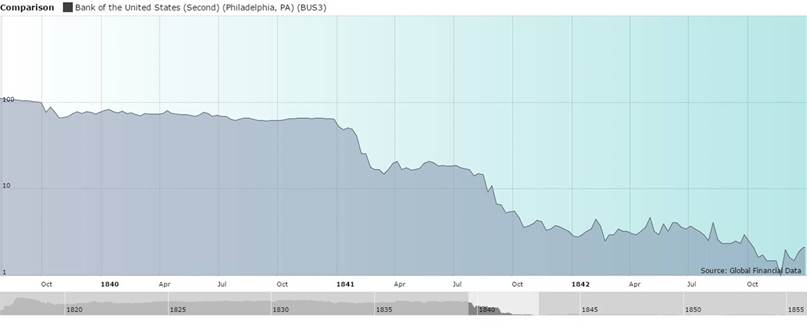|
“I sincerely believe, with you, that banking institutions are more dangerous than standing armies.” – Thomas Jefferson
At the end of the Bush administration’s time in office, the government, to the chagrin of some and applause of others, instigated one of the biggest bail outs in history. In 2009 the Obama administration continued Bush’s policies in this regard, however, they hoped they’d use the government’s generosity as leverage over the banking industry, arguing for lower bonuses and concessions on increased transparency and regulation. Fast forward to the 2016 presidential election and we have Democratic hopeful Bernie Sanders criticizing fellow Democratic hopeful Hillary Clinton for her acceptance of over $600,000 in speaking fees from banking giant Goldman Sachs. Sanders implies Clinton’s personal financial gain from Goldman Sachs and other banks which have paid her for speaking fees indentures her to the banking industry. Whether or not that is true, few people know. Many believe politics and banking have never been so closely tied, that our leaders have never been as beholden to banks as they are today. Politicians and banks have been holding hands since the founding of America.
It was Thomas Jefferson’s ardent belief that banking was not to be trusted, not because it wasn’t necessary, but its influence could pressure politicians and further, the government itself. On the other hand, Alexander Hamilton, George Washington’s Secretary of Treasury, fought hard for the establishment of a national bank. Modeled after the Bank of England, the First Bank of the United States was chartered in 1791. In 1811, The First Bank’s charter expired, however by then America was once again at war with Britain in the War of 1812 wreaking havoc and disorder among the US’s financial system. This turbulence forced Congress’ hand and they soon passed new legislation to establish the Second Bank of the United States. In 1816 President James Madison appointed Nicholas Biddle, a senator from Pennsylvania as director (and subsequently president of the Second Bank of the United States after his predecessor retired).
Between 1816 and 1828 the Second Bank grew in stature and importance, so much so that it was considered an essential agency of the government. Biddle, as the head of the Second Bank, developed the concept of central banking. Under his guidance, the Second Bank controlled America’s money supply, interest rates, lending policies, and held the government’s deposits. In 1844, the Inquirer, a newspaper published in Philadelphia, said about Biddle, “no man was more courted or eulogized.” He had taken an upstart bank and turned it into a powerhouse of fiscal policy.
Price: Bank of the United States (Second) (Philadelphia, PA) (BUS3)

As you can see in the chart, the share price started at 36 in 1816 but soared to 156 by September, 1817. Further, it weathered the storm of the recession of 1819 and stabilized afterwards at around 100.
Even though Thomas Jefferson and Alexander Hamilton had been long gone, their factions remained. Jefferson’s distrust in the banking industry as a political influencer was spearheaded by the new President, Andrew Jackson.
For years Jackson believed the Second Bank had influenced the 1828 presidential elections and had requested Biddle investigate his claims of corruption. Biddle steadfastly refused, building a lifelong resentment and enemy in the President. Jackson, like our modern Bernie Sander’s presidential campaign, was fearful of the Second Bank’s power and influence, culminating in public denouncements.
Not to be out maneuvered in a media war, Biddle had his own voice in politics; that of Kentucky Senator Henry Clay. The Bank financially backed Clay in the 1832 presidential race. It is ironic that the Clay-Jackson presidential race mirrors Sanders-Clinton’s propaganda battles. Jackson, like Sanders, argued the corruption of banking led to the taking advantage of the American farmer with higher interest rates and increasing hand in politics. Clay, more reminiscent of Clinton, positioned the need for the Bank (and the industry as a whole) as essential for the economic growth of the nation, allowing American businesses to expand to greater reaches through the access to credit.
The Bank’s charter was set to expire in 1836, but knowing it was a hot topic issue in the presidential race and could influence the outcome, Biddle applied for a renewal of the charter in 1832, throwing politics into turmoil. This was going to be a new kind of presidential race, one where the Second Bank was going to determine the next president, not the people.
Jackson, however, wasn’t going to take a punch without giving some back. As the sitting President, he vetoed Congress’s renewal of the Bank’s charter, taking the fight to the Supreme Court. Then, as a one-two combination, Jackson demanded Biddle return all of the government’s money the Bank held in deposits, stripping him of his power base. “The Bank,” Jackson wrote to Martin Van Buren in 1832, “is trying to kill me, but I will kill it.”
Ultimately, the veto held and Jackson defeated Biddle’s puppet presidential nominee Henry Clay in 1832, reaffirming Jackson’s triumph over Biddle and the Second Bank.
Thinking Biddle was done, Jackson began defunding the Bank, transferring up to 20% of the Second Bank’s capital to state banks friendly to the administration. Jackson firmly believed that Biddle had used the Bank’s money, and thusly the people’s money, to influence the 1828 presidential elections.
In 1834, Biddle wrote to a federal judge, “This worthy President thinks that because he has scalped Indians and imprisoned Judges, he is to have his way with the Bank.”
Biddle wasn’t the type of person to go down without a fight. Because Jackson had taken so much liquidity from the Second Bank, Biddle took to extreme measures to keep the doors open. He reduced the Bank’s money supply, demanded repayment on outstanding debts on personal borrowers, and made it difficult for businesses have access to loans and credit, and in response, interest rates soared to 12% and unemployment rose. Biddle thought if he damaged the economy enough, he could enrage the citizenry to remove Jackson from office. His plan backfired. The mob, seeing how the Bank was manipulating the situation, turned against Biddle, forcing him to flee to his house in Philadelphia, hire armed security guards, and bar his windows and doors.
Comparison: Bank of the United States (Second) (Philadelphia, PA) (BUS3)

The Bank’s charter expired in 1836, but it took 5 years for operations to wind down, as shown in the graph above where the share price plummeted from 119 in 1836 to 15 by 1841.
Exiled from the federal government, Biddle transformed the Second Bank of the United States into the U.S. Bank of Pennsylvania, a state chartered private commercial bank. In his head, he was to recapture his prestige once more. Bankers, by nature, are motivated by profit. Like the risky investments made by Lehman Brothers, Bear Stearns, Goldman Sachs, and AIG during the 2008 financial crises, Biddle too made excessively aggressive and treacherous ventures, including a convoluted attempt to monopolize the cotton industry. He, and his conspirators, were indicted for fraud and theft and though his lawyers got the charges dismissed (even in 1839 bankers weren’t held liable for their actions!), the US Bank of Pennsylvania closed down in 1843. Nicholas Biddle retreated into solitude, despondent at the loss of his stature and wealth.
Jefferson’s fear, and Jackson’s as well, did come to fruition. The power of the banking industry profoundly affected politics and could tinker with the American economy for its own gain. 200 years later, those who are for the banks, the Hamiltonians, and those who are against, the Jeffersons, remain as passionate as ever in their cause. The reality is that the US is not an agrarian society as Jefferson had envisioned and an advanced society demands a robust financial system that supports its various industries. As long as the US is growing, our banking industry will be tied to our evolution.
|